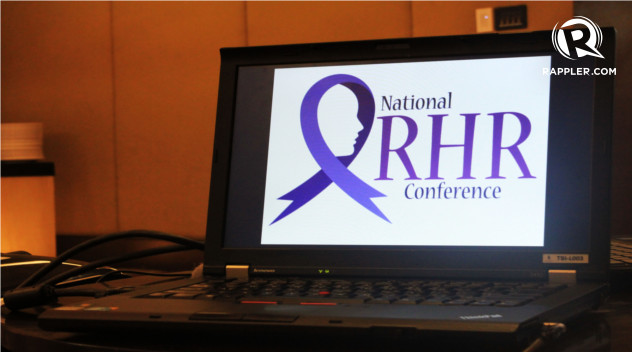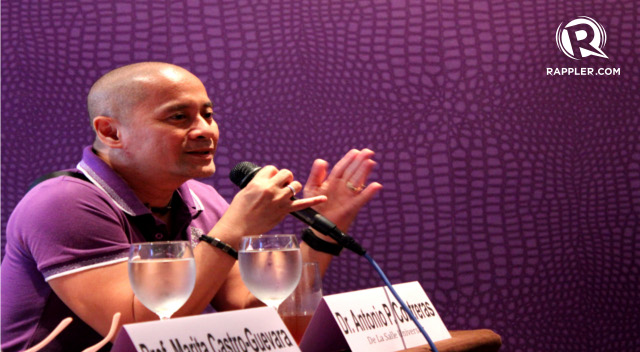SUMMARY
This is AI generated summarization, which may have errors. For context, always refer to the full article.

MANILA, Philippines – The Reproductive Health (RH) Law owes its passage in part to the academics who boldly pronounced their support amid criticism from their fellow academics and threats to their employment.
This was the consensus of advocates during the recent RH Rights National Conference organized by women’s rights group Likhaan.
The conference looked back to the lessons that the lobbyists have gained in their “over a decade of struggle.” One of these lessons was the integration of researchers and academics “who value empirical evidence” in the political movement.
Traditionally, academics are involved in public policy-making as a matter of prescriptive policy analysis.
According to Dr Antonio Contreras of the De La Salle University-Department of Political Science, there are 3 key players in the passage of any legislation: the policy-makers, the policy advocates, and the policy analysts.
Policy advocates are groups that come together by virtue of mutual interest and a shared political position to exert influence on the legislation process. On the other hand, policy analysts consist of experts and researchers who will provide dispassionate counsel and empirical evidence to assess benefits vis-à-vis costs of a particular policy, among others.
These analysts, who come up with research work to back up or deny the social contribution of a policy, mostly come from the academe. They are presumed to be neutral on the issue at hand, to ensure the credibility of their research.
The academe, Dr Contreras added, is an “exalted space.” Its members lend an air of credibility to a cause.
But is it unfair for those who produce the evidence for policy analysis to have their own prior agenda? Marita Castro-Guevara of the Ateneo De Manila Universty explained that it was in fact empirical evidence that encouraged them to support the now Republic Act 1054, and not vice-versa.
“For us, the evidence is so clear. Our people, especially the poor, our women, the youth need the RH law,” she said.
The beginnings
Explaining the beginnings of the pro-RH faction of academics, Guevara said “informal discussions” on the RH bill were initiated by Mary Racelis, a research scientist at the Institute of Philippine Culture based in the Ateneo De Manila University and a former UNICEF regional director in Africa.
These talks eventually led to the release of the first of 4 position papers entitled, “Catholics Can Support the RH Bill in Good Conscience.” That was in August 2008, almost 4 years ago. The paper examined social realities in light of Catholic social teachings.
(Below is the position paper entitled, “Catholics Can Support the RH Bill in Good Conscience.”)
To date, the paper serves as a solid document for advocates to root their positions on. There were also about 50 doctors from the Ateneo School of Medicine and Public Health who were among those who signed the succeeding documents.
According to Guevara, the faculty-signatories were inspired by the “wellsprings of their faith tradition,” while the non-Catholics and those who have no religion among them drew from “the wellsprings of authentic humanism.”
“So the key principles of the RH bill resonate to the principles of many faith traditions, including Catholicism and humanism, such as the sacredness of the human life, the dignity of the human person, preferential option for the poor, integral human development, human rights, and the primacy of individual consciences,” she explained.
The hurdles
Not everyone in the academe, however, was pleased with their statements. Forty-three international academics who were mostly American released an open letter in response to the 14 signatories of the Ateneo. The letter was printed as a full-page advertisement in the Philippine Daily Inquirer.
“Bishop Leandro Mendrozo also said over Radyo Veritas that the Ateneo faculty members who signed the statement declaring support for the RH bill may face investigation for heresy and sacked if found guilty,” Guevara added.
In a controversial campus paper editorial, the signatories were called “intellectual pretender and interlopers,” “lemons” and “cowards.” The article also called for their resignation.

Use academic freedom responsibly
Still, Contreras and Guevera believe that their advocacy was important in light of academic freedom. “Students take their cue from their teachers. If students see that their teachers take a stand on public issues, they are encouraged to begin their own process of discernment,” said Guevara.
Contreras, however, cautioned against not respecting the students’ positions. He said there are limits in the influence that a teacher should impose over his/her students.
“As teachers, as researchers, we have to be authentic. But at the same time, we have to be very careful that we don’t impose on our students our political leanings. Because, I think, as much as we want academic freedom, we could not use it as a basis for grading,” he said.
Guevara, on the other hand, thanked the Ateneo for encouraging “continuing discernment” rather than stifling critical discussion.
“One of the hallmarks of a true and great university is its ability to provide space for the respectful, critical, and intelligent exchange of views on issues,” she said. – Rappler.com
Add a comment
How does this make you feel?
There are no comments yet. Add your comment to start the conversation.